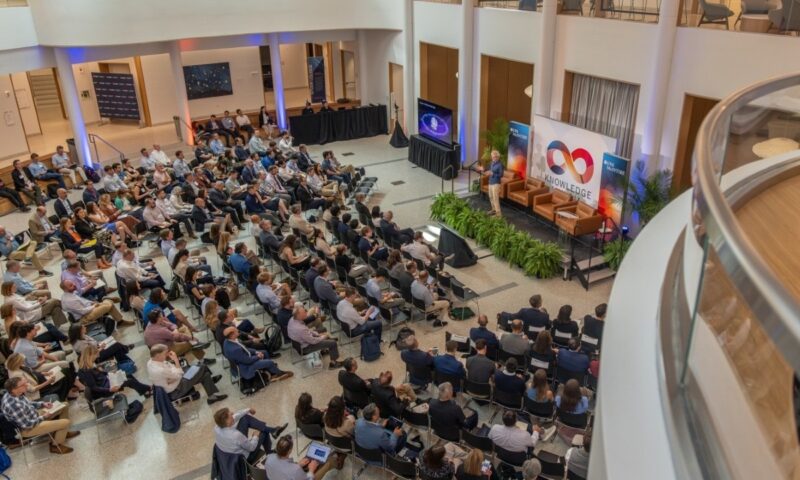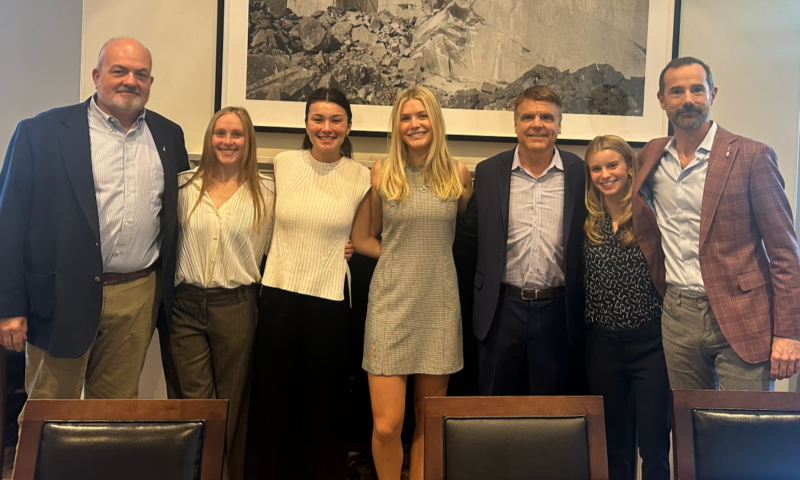Bronco Mendenhall winced at the memory.
Sitting in a lecture hall in front of some of the University of Virginia’s best and brightest students, the Cavalier Head Football Coach had just been asked for an example of a play call he regretted.
Without hesitation, Mendenhall brought up a game UVA fans know all too well, occurring in overtime during last season’s regular-season finale against Virginia Tech in Blacksburg, VA.
The Hoos held the Hokies to a field goal on Tech’s first possession of the extra period, then took the ball for their own possession. After gaining 11 yards on their first play, they appeared to be on their way to a game-winning touchdown that would snap a 15-year losing streak against their rival.
“We had control of the game,” Mendenhall said.
Then came the fateful decision.
Virginia called a play in which quarterback Bryce Perkins had the option to hand the ball to running back Jordan Ellis, or pull it back and pass or run it himself. Perkins elected to pull the ball back.
The rest is something that Mendenhall—and every Wahoo fan—would like to forget. Perkins fumbled, and the Hokies recovered, winning the game, 34-31.
While Mendenhall said their proprietary analytics support aggressive play-calling when in overtime on the road, in retrospect, he wishes he had been more conservative in that instance. Mendenhall said the call for a run-pass option created an “increased volatility.”
Of course, if he had known the outcome, Mendenhall said he would have called for a straight run or pass that wouldn’t have put as much pressure on Perkins at such a key juncture.
Unfortunately, nobody has the luxury of knowing the outcome beforehand. Not on the football field, not in the classroom, not in the workforce, not in the military—and especially not in UVA alumnus John Griffin’s (McIntire ’85) world.
This semester, the Board of Visitors member, who founded the hedge fund Blue Ridge Capital, has been teaching the seminar at UVA’s McIntire School of Commerce, “Deciding Wisely and Thinking Critically,” that Mendenhall addressed.
“Choice matters,” said Griffin, in an opening salute to students. “Everything we create and achieve results from a series of decisions. Unless you are terrifically lucky or unlucky, the quality of your choices will determine the quality of your life.
“And as you’ll find out, people—even McIntire students—are not naturally as good decision-makers as they think. That’s OK, because there are many ways to get better, and we are going to learn them.”
The lessons began with that talk with Mendenhall on the first day of class in January, and continued with visits from, among others, renowned investors Ian McKinnon and Julian Robertson, acclaimed Professor Dan Ariely, UVA President Jim Ryan, former CIA Chief of Staff Jeremy Bash, and professional poker player Maria Konnikova. Even UVA Men’s Basketball Coach Tony Bennett shared insights into his decision-making process by video.
Read All About It!
Griffin’s own quest for deeper knowledge began at age 12 while working a paper route in a town just outside New York City.
While delivering papers by bicycle, a young Griffin wondered about all the businesses he passed. Some appeared to be flourishing, while others floundered. “Why are these guys closing? What did they do wrong?” Griffin remembered when asked about his earliest interest in investing.
Neither of Griffin’s parents had business or finance backgrounds. Griffin’s father served in the British Air Force during World War II. He met Griffin’s mother when she was in England visiting Shakespeare’s birthplace as part of her Ph.D. program at Columbia University.
After getting married in 1952, Griffin’s father became a stay-at-home dad; Griffin’s mother was an English professor at the City University of New York. “My dad didn’t earn a paycheck his entire life,” Griffin said. “It was a complete role reversal.”
Growing up, soccer was one of Griffin’s passions. A big fan of the Cosmos—the old New York professional team that, for a time, featured the legendary Pelé—Griffin played for his public high school team and also traveled out of state for tournaments.
It was during one such tournament in Reston, VA, over Thanksgiving in 1980 when Griffin first considered attending UVA. He had looked at a few Division II universities where he could have continued playing soccer, but wasn’t that excited about their academic opportunities.
Then Griffin visited Grounds.
“I was one of those love-at-first sight guys,” Griffin said. “I was like, ‘This is it! I want to go to school here.’”
As an out-of-state student, Griffin knew he would have to work part time to pay his tuition, but he felt it would be worth it.
Four decades later, Griffin called the choice the “most impactful” decision of his life. “I owe my career to the University of Virginia, generally, and to the McIntire School of Commerce specifically,” said Griffin, who also is a graduate of Stanford’s Graduate School of Business.
In addition, the experience of paying for his education led Griffin in 2014 to establish the Blue Ridge Scholars program, a need-based scholarship program that will graduate its first full cohort of recipients this month.
Know When to Walk Away
With a green felt table sitting at the front of Room 118 in Robertson Hall, five students were called down, “Price is Right”-style, to play a poker game called Texas Hold ’Em against Maria Konnikova, a psychologist, New York Times best-selling author, and pro poker player.
“I want the class to dive deep into the topic of luck and skill—and to know the difference,” Griffin explained.
Konnikova dealt the cards, then discussed every player’s options.
A student drew an 8 and 9 of hearts.
“This is a very good hand in her position,” said Konnikova, a Harvard University alumna who got her Ph.D. in psychology from Columbia University. “It’s suited, and it’s connected, and her hand can be very well-disguised. You can make straights, you can make flushes—a lot of good things can happen with this hand.”
Another student draws a 3 of spades and an 8 of clubs—which Konnikova called a “trash hand”—and wisely folded.
Konnikova had a takeaway for the students. “It’s not just dependent on the cards,” she said. “It’s dependent on how I play the cards—and that is a very good way of talking about how decisions are made outside of the poker table.”
As the game concluded, Konnikova discussed the advantage of being the last player to play his or her hand. “It could be a contract negotiation; it could be a salary negotiation; it could be a conversation with someone you’re dating—if you have the last-mover advantage, this is an incredibly strong position.”
Konnikova said the importance of a player’s “tells”—subtle cues that may tip off an observant rival about their intentions—is often overinflated. “Usually it’s more of a behavior,” she said. “You observe people over time. You see how they behave at baseline, and then you see how they deviate from baseline and you try and get feedback …
“This is very important for situations that have nothing to do with poker.”
Konnikova discussed those types of situations—ones that often revolve around being “conned.”
In one such situation, she asked the students what their exit strategy would be if they were in New York City’s Penn Station and a stranger asked to borrow money for a train ticket because she had lost her wallet.
“My family’s waiting for me. My kids are going to be so upset if I don’t make it home,” said Konnikova, playing the role of the requestor. “If you give me your address, I’ll send you the money.”
“You see what I’m doing?” said Konnikova, breaking character. “I keep raising the stakes and making it more difficult for you to say no.”
The students’ exit strategies ran the gamut. One said she had no cash, while another, humorously enough, asked for collateral.
The point of the exercise was to illustrate the power of a good story.
“People are telling stories all the time, and that’s the backbone of what makes a con work,” Konnikova said. “Why is that? Well, stories have a very interesting property, which is that when we’re in the middle of a story, our logical, fact-checking faculties are circumvented.”
Konnikova said the best companies—the ones that raise the most money and get the public excited—tend to have the best narratives.
On the flip side are alleged con artists like Elizabeth Holmes, the CEO of Theranos, which was initially touted as a breakthrough health technology company, but became infamous for its false claims to have devised blood tests that only required very small amounts of blood.
“Cons work because, ultimately, you want to believe the story,” she said.
Konnikova’s advice for the students is to always be skeptical—even when there are no obvious red flags.
“The smarter you are, the more prone you are to think that you know what you’re doing,” she said. “Always question yourself—no matter how much information you have, no matter how much experience you have. Know that you’re fallible and that you can be conned. Know that you will be conned. Be OK with that. Be willing to take negative feedback; be willing to admit that you might be wrong, when you really want to be right.”
Griffin underscored the point.
“The first step to not being conned,” he said, “is to admit that you’re susceptible to being conned.”
The bin Laden Plan
Jeremy Bash had everyone’s attention. And how could he not? The former CIA Chief of Staff was describing how President Barack Obama was briefed on various courses of action for capturing or killing Osama bin Laden.
Bash recounted an after-hours meeting on a Friday evening at CIA headquarters with senior Pentagon leaders. In a board room, the group examined a model of the Pakistan compound they believed bin Laden was living in.
CIA personnel gave a brief overview of the intelligence they had gathered, then handed out PowerPoint slides of each course of action, or “COA.” They included a heliborne assault, a joint raid with Pakistani forces, and a B-2 bomber strike.
After the meeting, Obama was briefed in the White House situation room.
“His first instinct was the B-2 COA,” Bash said. “He liked the idea of not having any risk to our force. He basically said, ‘I’m leaning toward the B-2 COA, but I want you to figure out exactly what that entails.’”
Inside the CIA, Bash said, there were analysts who supported a bomber strike.
However, Bash said that when his boss, former CIA Director Leon Panetta, heard exactly how pulverized the target would be, he said he couldn’t recommend the action to Obama.
“The B-2 option was, in some ways, cleaner. It would have absolutely killed everyone in the compound. There would be no risk to our own force,” Bash said. “But it would have eliminated the ability of the world to see evidence that bin Laden was there. All of the DNA and everything at that compound would have been pulverized to dust.
“… Ultimately, I think the president and Mr. Panetta realized that we needed to have the evidence that bin Laden was there.”
Bash said Obama also shot down another of the potential COAs, a joint operation with Pakistan. “He said, ‘We’re not going to tell Pakistan. So take that one off the table.’”
Bash says it eventually became clear that the heliborne assault was the way to go.
At the conclusion of the talk, a student asked Bash how potential negative consequences—such as bin Laden not actually being in the house—played into the decision-making process.
“That’s a nightmare,” Bash said.
“… I think you obviously would have seen a ton of criticism of Obama, congressional hearings, heads would have rolled … and I think the whole thrust of the counterterrorism fight would have been altered.
“But I’ve got to say, too, I was so confident—probably overly confident. I don’t think I was cocky about it, but I do remember going over and over it in my head, like, ‘Is there a chance we’re wrong?’ And every time I tried to wring it out, I just couldn’t find a real rational way that we were.”
Super Bowl XLIX
Before Mendenhall talked about the play call he regretted against Virginia Tech, he sat in the back of the classroom as Griffin and the students examined what is considered one of the most infamous play calls in Super Bowl history.
Trailing the New England Patriots by four points late in Super Bowl XLIX, the Seattle Seahawks had driven all the way down the field and were poised to take the lead.
On second down and goal at the Patriots’ 1-yard-line with 26 seconds remaining, Seattle head coach Pete Carroll—with most people expecting him to hand the ball off to star running back Marshawn Lynch—called instead for a Russell Wilson pass. It was intercepted, ensuring the Patriots’ victory.
NBC’s Chris Collinsworth immediately questioned the decision. Other commentators, like Hall-of-Fame cornerback Deion Sanders, followed suit. Twitter exploded as only Twitter can. The next day’s newspapers featured headlines such as “Worst Play Call Ever.”
“Was this a bad decision?” Griffin asked the class.
“I think you have to step back from the outcome a little bit when you’re trying to evaluate the decision,” one student said.
Griffin nodded in agreement. “If you know the outcome, that will always color whether you think it was good or bad,” he said.
“Outcomes are important. We’re not here to change that. But when we go back in time, we have to be very careful not to let our emotions and our biases influence how we see decision-making.”
After joining the discussion, Mendenhall said the best coaches can make decisions based on statistics and intuition and block out all the noise.
In reality, Mendenhall said Carroll’s play call was the “perfect play” for what the defense was going to do.
However, as a coach, Mendenhall knows one of the first questions media members will ask at the post-game press conference will be whether he would have done things differently if given another chance.
“My job is totally outcome-driven, yet to make decisions, there is outcome bias,” Mendenhall said. “And so, to navigate that … yeah … good luck.”
Griffin said the key to improving decision-making is having a way to go back after the fact and measure the quality of the decision. To that end, he said many of the best investors he has known keep a journal, which allows for a record of the salient factors at the time of the decision, not with the hazy memory of hindsight.
“Investors could benefit from the scientific method. You hold a hypothesis, and then you run an experiment,” Griffin said. “If you do it the opposite way and you don’t have a hypothesis and run an experiment and then make your hypothesis, that’s not terrible—but now you have to run a separate experiment with your hypothesis.
“Hundreds of millions of dollars have been lost on this very simple premise.”
Griffin implored the students to be more self-aware.
“What I want you to take away is that we are all cognitively challenged,” he said. “We aren’t the greatest evaluators of our own cognitive biases. But that is OK, because we can improve.
“In my business, the money management business, self-awareness can be the difference between enormous profits versus ordinary performance, or devastating losses. Improvement in decision-making comes from increased awareness of our biases, which isn’t easy, but can be done. It also makes for greater well-being.”
Guest Speakers
Dan Ariely,* Professor of Behavioral Economics and Psychology at Duke University
Bronco Mendenhall, UVA Football Coach
Ian McKinnon, Founding Partner at Sandia Holdings
Julian Robertson*, Founder of Tiger Management
Maria Konnikova, writer, psychologist, professional poker player
Rick Gerson, Founder of Falcon Edge Capital
Jim Ryan, UVA President
Jeremy Bash,* former Chief of Staff at Department of Defense and CIA
Tim Ferriss,* angel investor, author, entrepreneur
Jonathan Haidt, social psychologist at New York University’s Stern School of Business
Tim Wilson, writer and social psychologist at UVA
David Greenspan, Founder of Slate Path Capital
Jaffray Woodriff, Founder and CEO of Quantitative Investment Management
Tony Bennett,* UVA Basketball Coach
*Appeared via video.
By Whitelaw Reid, University News Associate, Office of University Communications, wdr4d@virginia.edu, +1 434-924-7499. This story first appeared in UVA Today May 1, 2019.



